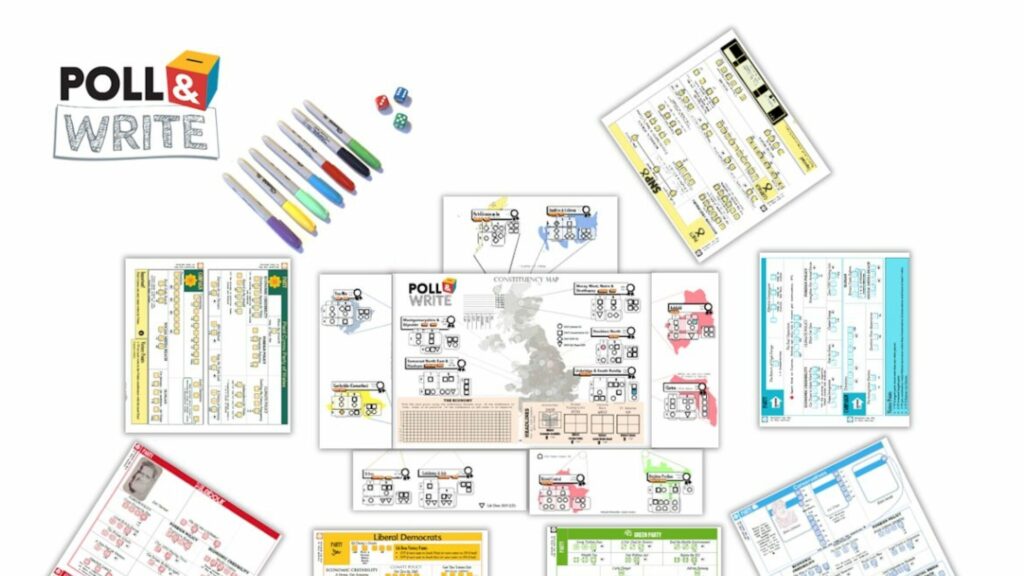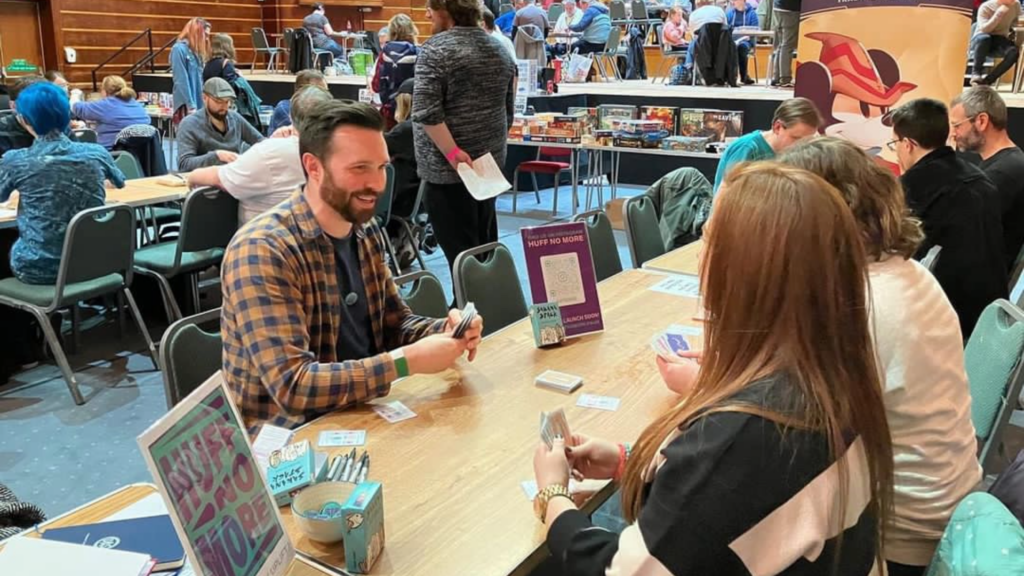
Joe: Heya Sam. You’re midway through the Kickstarter campaign for Poll & Write, and it’s going really well! Congrats on funding so quickly!
Can you start by telling us a little about yourself and Samphire games?
Sam: I’ve been designing games for about seven years but Poll & Write is the first one I’m publishing. My day job is in educational publishing – one of the areas I look after is A Level Politics, which along with my degree in politics explains the motivation to make an election game!
Joe: You’d had a plan for this Poll & Write for a while, and I think originally you were expecting a December 2024 election (like the rest of us). How did you feel on that rainy morning when the UK General Election was called?

Sam: Oh god, that was an emotional morning! I had been almost certain Rishi Sunak would call it for November and it would have been just before my birthday! When I went into work that morning and fired up my work Twitter feed I was fixated on some ominous tweets. I can’t remember exactly but I think the first one I saw was an out of context tweet along the lines of “he’s going to call it, isn’t he?”. Tweets are very often out of context so you have to be in on the day’s conversation to follow what’s happening – I didn’t believe it for a while, but it became increasingly clear what was about to happen.
It matters for my work as well – short term it affected the magazine we make (which I’d already planned out without election topics!) and we also create a case study resource which I had an author lined up for. I was already anticipating a change of government which could well lead to education policy shifts which would affect the business so that was on my mind too.
I already had a plan for the game; I’d designed the 2019 game and playtested it pretty thoroughly over the last year, intending to have the game system ready to go. Which I did!
Ooo, I’m not ready for this!
My initial feeling was “ooo, I’m not ready for this!” I’d been planning to run a Kickstarter for the 2019 game – the one based on the last election – first. I hadn’t put pen to paper for the 2024 game when the election was called. Then I remembered “this is the plan!” and went with it!
Joe: Wow, I didn’t realise that you hadn’t actually got any of the 2024 version down – but I suppose that politics changes so fast anything would become out of date pretty fast (for non-UK readers, we currently have a habit in the country of changing our current leader on a regular basis).

I suppose at this point, you could have decided to continue with the plan, and create a retrospective of this election to crowdfund later in the year. What drove you to get the game out before then?
Sam: That’s a good question. I’m not sure I even considered doing that! I think because it’s a fairly niche theme I thought the best time to maximise interest would be to do it over the election period. And it has the bonus of giving me a deadline, which is very helpful to get creative work done!
Joe: Well I’m glad you did! 6 weeks ago you’re suddenly in this new situation when you need to get the game out of the door, and quickly. What did you prioritise and how did you make it all happen in super-quick time?
Sam: The first thing I needed to do was figure out what was going to replace Brexit in this election. In the 2019 version of the game, each party had a Brexit stance that affected a few core things – particularly the victory condition. So the Brexit Party gained a lot of points if the largest party had a pro-Brexit ‘Leave’ stance. All voters were either Leavers or Remainers (and yes, it’s split about 52%/48%).
So for the 2024 versions, I focussed on the economny (‘It’s the economy, stupid!’), I figured out that each party’s previous ‘Brexit policy’ could be replaced with an ‘Economic Credibility’ track. The Conservatives start with an advantage on this but they will find it hard to get higher on it! I then took my best educated guess at what the party manifestos would look like – I had already been making notes throughout the last few months as to what slogans we might see. This has been something that’s developed since the manifestos were released – ‘securonomics’ was the subtitle of Labour’s economic track, but they didn’t use it in the manifesto, so now it’s ‘Wealth Creation’.
The next step was researching the constituencies. I needed a good spread of five battlegrounds that would represent what I thought the election was going to centre on. This is difficult to predict – in 2019 we didn’t know for sure that the ‘Red Wall’ would be such an important battleground. These constituencies might well change – if Sunak loses his own seat for example I might want to include it in the final version of the game. All those thematic considerations, which are really important to me, have to be put against balancing the demographics that each party targets, and some of the special categories that some abilities target, like ‘South East’ and ‘Rural’.
Joe: I love that you’re creating two things simultaneously: a game and a historical artefact or record of a moment in history! As it could be seen as both, how are you managing a game that should be balanced, vs an outcome (in reality) that probably isn’t? And what elements of reality are important for the game?
Sam: That’s been one of the biggest challenges. For the last couple of weeks at least it’s been really clear that the Conservatives are going to lose badly. I was worried about that for a while. I even started looking at Hollandespeil’s Tabel Battles: Doomed, where one side actually cannot win. That would have added in an extra design challenge!
But it’s important to have a bit of perspective – this is something I have to do in my day job when we are trying to future-proof the text of things we publish, and plan magazines in advance. You need to think ‘if the result is X, how will it feel to be playing this game with that knowledge?’ Although the result will probably look like it was inevitable – as events tend to, with hindsight – I think people can step outside and imagine alternatives.

So on the one hand, historical games should allow for feasible alternative endings, but they should also allow for a bit of fantasy. In my 2019 game you could play each party with alternate leaders and policy positions – so you could play the Conservatives with Rory Stewart at the helm, as a ‘Remain’ party. I put this option in partly to reflect the fact that the leaders had all changed so much (or been prone to change or challenge in Labour’s case). But also to allow players a bit of choice as to what character they put themselves into in the game.
Joe: How have you managed the fast tracked workload over the past few weeks?
Sam: With lots of help! I’ve got three kids and I’m working full time so it’s been a challenge. Other things (like my usual training sessions) have had to give and my partner’s been great. I’ve had quite a few late evenings and long lunches working on the prototype and promoting the Kickstarter too.
Playtesters have been fantastic – at the UK Games Expo where I had some lovely people come up to play quite a few games in the playtest zone; and at Chance and Counters and the North Street Games nights in Bristol. I’ve also got a small team of remote playtesters who I’ve sent the files to – they feed back using an online form. I’ve had brilliant feedback – both positive and constructive – although there was one non-gamer whose interest was piqued through politics, but who couldn’t get through the rules unfortunately. I’m working on making them more accessible.
Joe: What’s your strategy for promotion? Have you explored the dark art of Instagram adverts? Or have you used other methods to get the kickstarter out in front of the right folk?
Sam: I haven’t paid for anything in marketing terms. The reason I’ve gone for print-and-play games in the first place was partly because I didn’t have funds to risk in creating the art needed to succeed on Kickstarter for the kind of sums needed for a boxed game. I know if you are willing and able to risk a few thousand on art and on marketing, then the chances of success rise. But nothing is guaranteed. And the most important thing to do seems to be to build your audience. So I decided to do that through print-and-play, with the hope I can both build an audience and have some funds to put into art and marketing for future games.
This game works well for this as well because it’s quite niche, so I wasn’t sure it would find a huge audience. The theme has occasionally been a hard sell, but in the right Venn diagram it’s been really popular!

On marketing, I’ve tried a lot of things! I do a lot of marketing in my day job – parts of it involve copywriting and postal and email marketing. So I’ve applied a lot of principles and I’ve been lucky to be able to use those channels (Twitter, the magazine I run through work, and email lists) to pick up some interest from teachers of Politics.
Putting out requests for playtesters has worked well, particularly through Bluesky (which is a new platform like the way Twitter used to be – it’s small but I’ve picked up a couple of particularly dedicated playtesters that way). I am running an ‘election prediction competition’ which is a fun way to engage the right kind of people, and managed to pick up a lot of interest in that on Reddit. Instagram has been one of the more successful channels too, especially with some mutual support from other designers.
Online I find you just have to keep trying things, and not get disheartened when some things disappear without trace. Just keep ploughing on – without making it the whole focus of your day. Little and often seems to be the best way.
the most firm and sustained interest I’ve got is when I playtest in person
But I think the most firm and sustained interest I’ve got is when I playtest in person. Obviously it helps to be able to explain the game in person, and I get such great feedback that way. People do tend to go away saying they’d back it and play it again – and I’m seeing a lot of those people have indeed come back to back the Kickstarter, which is great! The one thing I regret is that I could have hugely benefited from having a stall at UKGE (instead of just a table for 3 hours in the playtest zone), but of course I didn’t think back in March that the Expo would be happening just after the election was announced!
Joe: Last question – what have you learned about yourself from making a game to such a tight deadline? And would you do it again?
Sam: That question has got me to stop and reflect, which isn’t something I’ve had time to do for a couple of weeks. I suppose it has shown me that I could do this all day long, as I have been where possible! I’m thriving on switching between playtesting, designing, and promoting the game. It’s definitely pushing away any self-doubt.
Yes, I’d do it again. I predict the next general election will be in 2028, and I look forward to making a Poll & Write game for it, although perhaps with a bit more warning!
Poll & Write 2024 is on Kickstarter until Friday 5th July, and a pre-release version will be available to backers from 3rd July ready for election night gaming!
If you enjoy the post, go and find Sam on Instagram, and then subscribe to the blog for more interviews!


